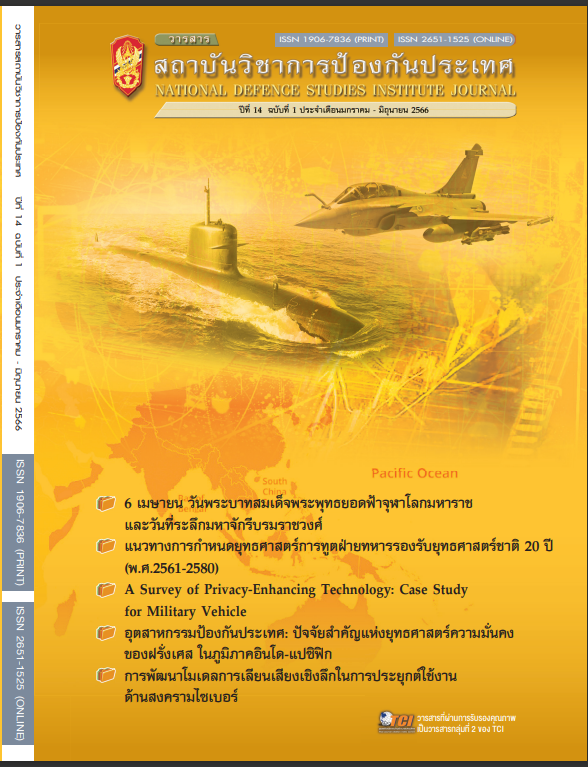The Learning Management during the Covid-19 Pandemic and the Capacity of the Students that Affects Learning Achievement of the Students in the Royal Thai Army Branch Service Schools
Main Article Content
Abstract
The objectives of this research were 1) to study the demographic data affecting the students’ achievement in the Royal Thai Army schools, 2) to investigate the influence of the learning management in the COVID-19 era on the students’ achievement in the Royal Thai Army schools, and 3) to examine the capacity of the students affecting the students’ achievement in the Royal Thai Army schools. This study employed a mixed research method. Data for the quantitative research were collected from 400 samples who were students enrolling in the Royal Thai Army Schools using a ques tionnaire. The descriptive statistics used in the data analysis included frequency, percentage, mean, and standard deviation. In addition, Data were analyzed with inferential statistics such as t-test, f-test, and Multiple Regressions. The results from the analysis were used as a guideline for an in-depth interview with nine informants, and the data from the interview were analysis using a qualitative approach.
The results from the hypothesis testing showed that 1) demographic factors including age, rank, level of civil education, average monthly income, selected army schools, and curriculums could potentially lead to differences in the students’ achievement with the statistical significance level at 0.05; 2) When considering the relationship between the learning management in the era of COVID-19 pandemic and the achievements of the students enrolling in the Royal Thai Army schools, it was found that teachers, educational personnel, and the information technology were three related aspects with the statistical significance level at 0.05; 3) When considering the students’ capacity, it was found that Intellectual intelligence and social intelligence were related with the statistical significance level at 0.05.
Article Details

This work is licensed under a Creative Commons Attribution-NonCommercial-NoDerivatives 4.0 International License.
The articles, images, tables, graphs, written content, and opinions published in this journal are solely those of the authors and do not necessarily reflect the views or positions of the National Defence Studies Institute or its academic affiliates.
References
กระทรวงศึกษาธิการ. (2563). รููปแบบการจัดการเรียนรู้สำหรับนักเรียนระดับการศึกษาขั้นพื้นฐานที่ได้รับผลกระทบจากสถานการณ์โควิด-19.
ฐานวัฒน์ พุฒิบูลย์วุฒิ. (2552). ปัจจัยที่ส่งผลต่อผลสัมฤทธิ์ทางการเรียนของนักเรียนจ่าอากาศในหลักสูตรประกาศนียบัตรวิชาชีพ โรงเรียนจ่าอากาศ พุทธศักราช 2548 (วิทยานิพนธ์ปริญญาครุศาสตรมหาบัณฑิต). จุฬาลงกรณ์มหาวิทยาลัย.
ธวัชชัย ศุภดิษฐ์. (2556). ปัจจัยที่มีผลต่อผลสัมฤทธิ์ของการเรียนในระดับปริญญาโท ของสถาบันบัณฑิตพัฒนบริหารศาสตร์ ปีการศึกษา 2554 (งานวิจัยสถาบันบัณฑิตพัฒนบริหารศาสตร์). สถาบันบัณฑิตพัฒนบริหารศาสตร์.
ประณีต เจริญวาศน์. (2555). การจัดกิจกรรมการเรียนที่เน้นผู้เรียนเป็นสำคัญ วิชาวิทยาศาสตร์ เรื่องแรง ชั้นมัธยมศึกษาปีที่ 3 กรณีศึกษา : โรงเรียนพระพรหมพิทยานุสรณ์ (วิทยานิพนธ์ปริญญาวิทยาศาสตร์มหาบัณฑิต). มหาวิทยาลัยราชภัฏนครศรีธรรมราช.
พิชญาภา ยืนยาว. (2560). ปัจจัยความฉลาดที่ส่งผลต่อคุณลักษณะที่พึงประสงค์ของนักศึกษาหลักสูตรครุศาสตร์บัณฑิต มหาวิทยาลัยราชภัฏนครปฐม (รายงานผลการวิจัย). มหาวิทยาลัยราชภัฏนครปฐม.
พิชญ์ภัชกัญจน์ ปานเผือก. (2560). ปัจจัยที่ส่งผลกระทบต่อผลสัมฤทธิ์ทางการเรียนของนักเรียนชั้นมัธยมศึกษา : ศึกษาเฉพาะกรณี นักเรียนในโรงเรียนขยายโอกาส สังกัดสำนักงานเขตภาษีเจริญ กรุงเทพมหานคร (การค้นคว้าอิสระหลักสูตรรัฐศาสตร์มหาบัณฑิต). มหาวิทยาลัยธรรมศาสตร์.
สุพิชญ์กฤตา พักโพธิ์เย็น. (2560). การศึกษาปัจจัยที่ส่งผลต่อผลสัมฤทธิ์ทางการศึกษาของนักศึกษาระดับบัณฑิตศึกษา สาขาวิชาหลักสูตรและการสอน มหาวิทยาลัยธุรกิจบัณฑิตย์ (วิทยานิพนธ์ปริญญาศึกษาศาสตร์มหาบัณฑิต). มหาวิทยาลัยธุรกิจบัณฑิตย์.
สุวัฒน์ บันลือ, และขนิษฐา อินทะแสง. (2563). ประสิทธิภาพระบบตรวจสอบการเข้าชั้นเรียนด้วยภาพใบหน้าโดยใช้เทคนิคแอลบีพี. วารสารมหาวิทยาลัยราชภัฎร้อยเอ็ด, 14(1), 147-158. สืบค้นจาก https://so03.tci-thaijo.org/index.php/reru/article/download/209353/164361/834672
Yamane, T. (1973). Statistics: An Introductory Analysis (3rd ed.). New York: Harper and Row Publications.


